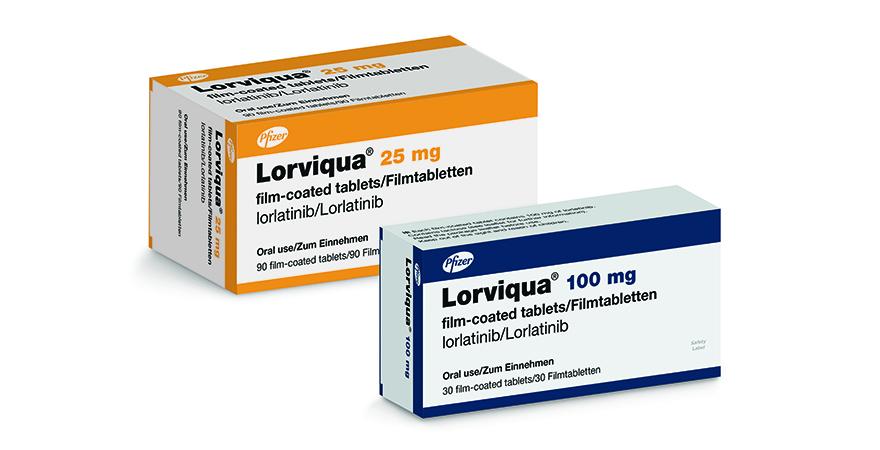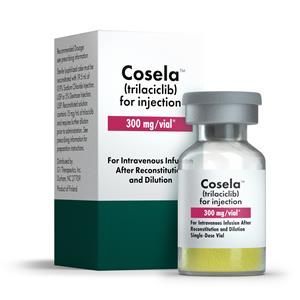Lorviqua (lorlatinib) vs Cosela (trilaciclib)
Lorviqua (lorlatinib) vs Cosela (trilaciclib)
Lorviqua (lorlatinib) is a targeted therapy specifically designed as an anaplastic lymphoma kinase (ALK) inhibitor for the treatment of patients with ALK-positive metastatic non-small cell lung cancer (NSCLC), particularly those who have progressed on prior ALK inhibitors. Cosela (trilaciclib), on the other hand, is a cyclin-dependent kinase 4/6 (CDK4/6) inhibitor used to prevent chemotherapy-induced myelosuppression in adults receiving certain types of chemotherapy for extensive-stage small cell lung cancer (ES-SCLC) and is not a treatment for the cancer itself. The choice between Lorviqua and Cosela would depend on the specific type of lung cancer a patient has and the goal of treatment, with Lorviqua being used as a direct cancer treatment in ALK-positive NSCLC, and Cosela being used to protect against the side effects of chemotherapy in SCLC.
Difference between Lorviqua and Cosela
| Metric | Lorviqua (lorlatinib) | Cosela (trilaciclib) |
|---|---|---|
| Generic name | lorlatinib | trilaciclib |
| Indications | Used to treat non-small cell lung cancer (NSCLC) with ALK or ROS1 gene mutations | Used to decrease the incidence of chemotherapy-induced myelosuppression in adult patients with extensive-stage small cell lung cancer (ES-SCLC) |
| Mechanism of action | ALK and ROS1 tyrosine kinase inhibitor | Cyclin-dependent kinase inhibitor (CDK4/6 inhibitor) |
| Brand names | Lorviqua | Cosela |
| Administrative route | Oral | Intravenous |
| Side effects | Edema, peripheral neuropathy, cognitive effects, dyspnea, weight gain | Fatigue, hypocalcemia, increased aspartate aminotransferase, increased alanine aminotransferase, hypertension |
| Contraindications | Hypersensitivity to lorlatinib or any component of the formulation | Hypersensitivity to trilaciclib or any component of the formulation |
| Drug class | Tyrosine kinase inhibitor | Cyclin-dependent kinase inhibitor |
| Manufacturer | Pfizer | G1 Therapeutics |
Efficacy
Lorviqua (lorlatinib) Efficacy in Lung Cancer
Lorviqua, also known by its generic name lorlatinib, is a medication specifically indicated for the treatment of patients with anaplastic lymphoma kinase (ALK)-positive metastatic non-small cell lung cancer (NSCLC) who have progressed on crizotinib and at least one other ALK inhibitor for metastatic disease, or whose disease has progressed on alectinib or ceritinib as the first ALK inhibitor therapy for metastatic disease. Lorlatinib is a third-generation ALK tyrosine kinase inhibitor (TKI) designed to inhibit the most common tumor mutations that drive resistance to earlier ALK inhibitors.
The efficacy of Lorviqua in lung cancer has been demonstrated in clinical trials. In a pivotal phase 2 trial, lorlatinib showed substantial antitumor activity in patients with ALK-positive NSCLC who had failed previous ALK inhibitors. The response rates were significant, with a considerable proportion of patients experiencing a reduction in tumor size. Additionally, lorlatinib has been shown to have activity in the central nervous system (CNS), which is particularly important given the propensity for ALK-positive NSCLC to metastasize to the brain.
Cosela (trilaciclib) Efficacy in Lung Cancer
Cosela, with the generic name trilaciclib, is a first-in-class therapy approved to decrease the incidence of chemotherapy-induced myelosuppression in adult patients when administered prior to a platinum/etoposide-containing regimen or topotecan-containing regimen for extensive-stage small cell lung cancer (ES-SCLC). Trilaciclib is a cyclin-dependent kinase 4/6 (CDK4/6) inhibitor that helps protect bone marrow cells from damage caused by chemotherapy by transiently arresting bone marrow cells in the G1 phase of the cell cycle.
The efficacy of Cosela in lung cancer was evaluated in multiple clinical trials where it was administered before chemotherapy. In these studies, Cosela significantly reduced the incidence of severe neutropenia, which is a common and potentially life-threatening side effect of chemotherapy. By reducing the occurrence of neutropenia, Cosela helps to maintain the dose intensity of chemotherapy, potentially improving outcomes for patients with ES-SCLC. Furthermore, the use of Cosela was associated with a lower need for supportive treatments such as granulocyte colony-stimulating factors (G-CSFs) and red blood cell transfusions.
Regulatory Agency Approvals
Lorviqua
-
European Medical Agency (EMA), European Union

-
Food and Drug Administration (FDA), USA

-
Health Canada

-
Therapeutic Goods Administration (TGA), Australia

Cosela
-
Food and Drug Administration (FDA), USA

Access Lorviqua or Cosela today
If Lorviqua or Cosela are not approved or available in your country (e.g. due to supply issues), you can access them via Everyone.org.
How it works

Make an enquiry
Choose the medicine you want to buy, answer a couple of questions, and upload your prescription to speed things up. We’ll get back to you within 24 hours.


Make an enquiry
Choose the medicine you want to buy, answer a couple of questions, and upload your prescription to speed things up. We’ll get back to you within 24 hours.


Breeze through the paperwork
We'll guide you through the required documents for importing unapproved medicine, ensuring you have all the necessary information.


Get a personalized quote
We’ll prepare a quote for you, including medicine costs and any shipping, administrative, or import fees that may apply.


Receive your medicine
Accept the quote and we’ll handle the rest - sourcing and safely delivering your medicine.

Some text on this page has been automatically generated. Speak to your physician before you start a new treatment or medication.
Let's talk
If you have any questions, call us or send us a message through WhatsApp or email:
Contact us




